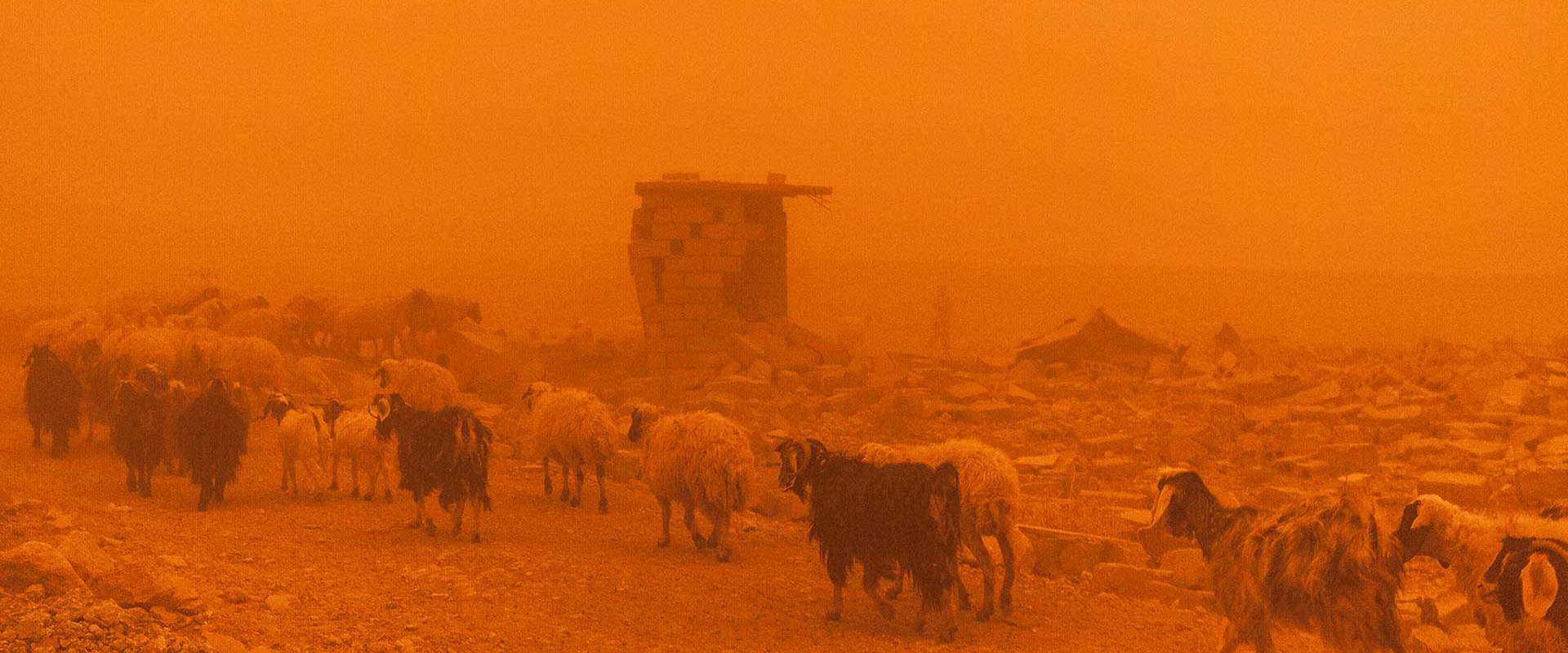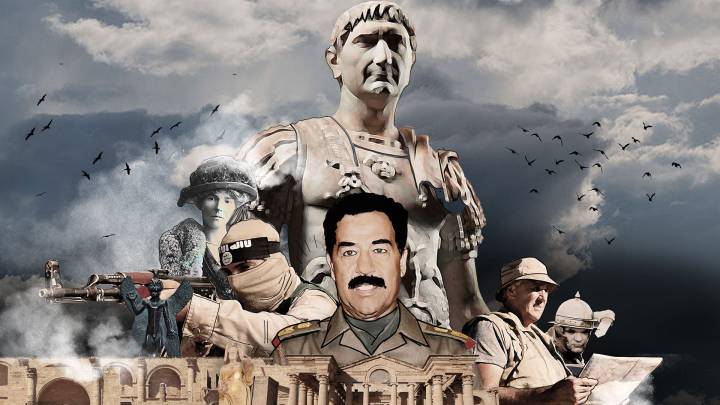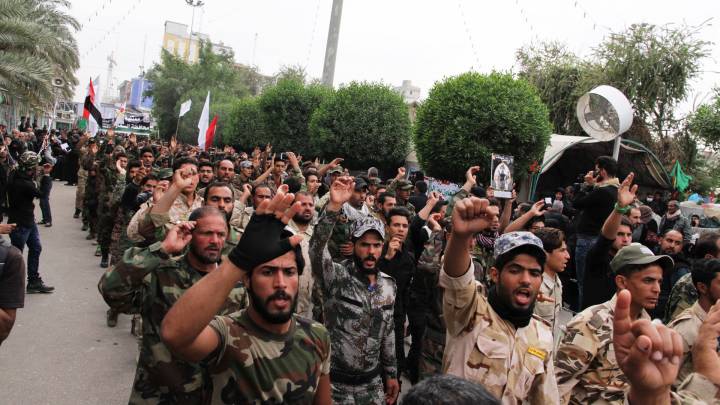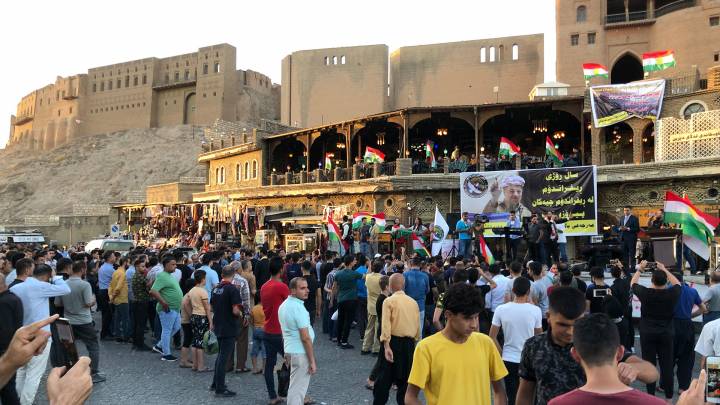A year after the military defeat of the so-called Islamic State group in Iraq, livestock breeders living in the outskirts of Mosul cannot afford to repopulate herds decimated by the war, drought, climate change and government neglect.
A proverb shared among Iraqi farmers in hard times says that the loss of a cattle is more serious than the loss of a child. Yet, thousands of farm animals starved to death or got confiscated during the Islamic State reign over a third of Iraq.
“The economic situation was disastrous and money insufficient to buy wheat to feed cattle. About 60 per cent of my 900 goats died from starvation,” said 25-year old Farhan Mohammed Jassim sadly, a farmer in Tishtah, a village located 50 kilometres to the west of Mosul where the cattle population has halved.
Following its conquest of Tishtah village in June 2014, the so-called Islamic State took control of the wheat trade to generate substantial financial profits. The group pushed the price of a 50kg bag from about €10 up to €70. “We were starving too, split the wheat between us and the cattle was a life and death issue” Jassim said.
In addition to overpricing cattle fodder, the so-called Islamic State also imposed Zakah on farmers, one of the five pillars of Islam that obliges individuals to donate a certain proportion of wealth to charity. Once a year, jihadists would eventually collect one animal out of forty, often the strongest animals of the herd.
Uncertain future
A year after the military defeat of the Islamic State in Iraq, major progress is being made to rebuild urban centres, but villages remain largely forgotten.
“There is no one to help us, most farmers cannot afford to repopulate herds decimated by the war and no one will grant us a loan,” said Jassim. Consequently, 50 per cent of the 60 farms established in Tishtah have closed and the average income per family was slashed by half to touch down €75 per month.
Contacted by zenith, a spokesman for the Ministry of Agriculture, Hameed Al-Nayef, claims that initiatives to support livestock breeders exist, but remain insufficiently funded and reserved to those licensed by the Ministry.
Hamda Khalaf, 70, never heard of such an ‘agricultural licence’. Sitting on the dusty ground beside a friend, she silently mourns the loss of her goats, chicken, sheep and cows. “When the Islamic State captured our village, I fled with only my clothes in hand and had to leave all my animals behind,” Khalaf said.
Despite the visible despair and economic distress among farmers, Nineveh Governor Nofal Hammadi told zenith that villages in the outskirts of Mosul are more beautiful than before the arrival of the so-called Islamic State. “Tell him to come and have a look!” screams in a fit of anger Saleem Abdullah Hamad, Head of Tishtah.
Sense of abandonment
In Qaryat Al Ashiq, a village just a few kilometres away from Tishtah, farmer Salam Mohammed Khalaf, 36, lost his fourth cow when it stepped on a landmine. “Witnessing my cow explode in an agricultural field saddened me”, he said.
After informing the Iraqi Army of the dangerousness of the area, Khalaf got answered that the vast fields which border rural villages cannot be cleared. According to Mahmoud Yassen Noman, the Head of the village, demining operations have nevertheless been carried out for farmers who have acquaintances with local officials, others are left with unexploded rockets and mines. “Dying would be better than living in such situation,” Noman said.
“The sense of abandonment is an endemic problem in Iraq, created by the central government both prior to 2014 and in the present,” Ibrahim Al Marashi, an associate professor of Iraqi history at the California State University San Marcos told zenith. A research published in 2016 by the Institute for the Study of War (ISW) asserts that the failure to create an effective local governance could drive Sunni populations to redress their grievances.
Exasperated by the destruction of their houses and herds, families from Tishtah claimed for compensation to the Governorate of Nineveh in March 2018. To date, none of them have ever received any news. “I receive no support from local authorities to rebuild my house, I had to take a €880 loan but I’ll need a year to pay it back,” said farmer Ali Khalil Ibrahim.
According to the Regional Food Security Analysis Network (RFSAN), restoring agriculture should be a central component of the reconstruction efforts in Iraq.
The natural environment neither works in favour of Tishtah’s farmers. “Before, herds would graze grass to complete the in-house feeding. Unfortunately, grass is more scarce due to the water crisis and feeding cattle exclusively with wheat is too costly” said Ibrahim. Once a water-rich country, Iraq now faces its worst water crisis since 1931 as rainfall halved. Between 1991 and 2017, the share of agriculture in Iraqi employment has fallen from 34 percent to 19 percent.
Among the 16,000 livestock breeders living in the vicinity of Mosul, few seem to believe that the governmental institutions are capable of properly handling the post-Islamic State challenges. “Cattle is our main source of income, so we will fight, but we don’t know what our future will be made of,” Fahan Mohammed Jasem said.











